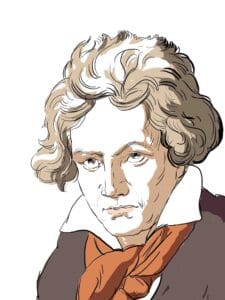LUDWIG VAN BEETHOVEN - FAMOUS BIPOLAR MUSICIAN
Ludwig van Beethoven is one the world’s most popular classical music composers. Beethoven was baptized on 17th December, 1770 at Bonn. Though his exact date of birth is unknown, many writers believe he was born the day before he was baptized. Though he wrote only nine symphonies, Beethoven started learning music at a tender age as his father, who worked as a part-time tenor singer at the court of Elector of Cologne gave him lessons on piano and violin and had his first public performance when he was six.
Beethoven moved to Vienna with the help of the Elector, where he established his career. Beethoven built a reputation as a piano virtuoso and also played in the salons of nobility preludes and other works of other musicians of the time. Much of his time was spent composing but he kept most of his works from the public until 1795 when he held a public performance. The first publication of his works was dedicated to his patron Prince Lichnowsky from which he made a fortune.
Beethoven suffered intermittently during his life with bouts of serious fevers and headaches. During one of such bout, he spent some time with Tplits, where he was believed to have written three love letters which were addressed to an immortal beloved, whose identity is still unknown. He also went through an emotional period , which had a negative impact on the output of his compositions. There was also degradation in his manners as well as his personal appearance, which are all symptoms of a depression, which may have been caused by bipolar disorder. He had romantic partners who were married women which made Historians believe he fathered the children of these women.
Beethoven became deaf in an early age and this is believed to have been caused by bipolar disorder. He was also believed to have suffered from irritability caused by chronic abdominal pain that has been attributed to lead poisoning. His condition got so bad that after a performance, he had to be turned around to see his audience applaud, to which he responded with tears. He contemplated on committing suicide at one point of time, which he documented in his Heiligenstadt Testament. The thought of suicide is one of the warning signs of bipolar disorder. Beethoven’s friends, encouraged by his personality strength helped him in diverse ways to cope with life.
Beethoven also had disregard for social ranking and for authority. He was reported to have stopped performances when he did not have the full attention of the audience. He also used to refuse to perform, if he was not informed well ahead of time. This led to many confrontations which led to decree of the Archduke Rudolph that, Beethoven was excluded from normal rules and etiquette in the court.
Beethoven died on 26th March, 1827 after a long illness which left him bedridden. An autopsy at the time of his death revealed a damaged liver attributed to heavy alcohol consumption. Beethoven was buried in a communal grave.
